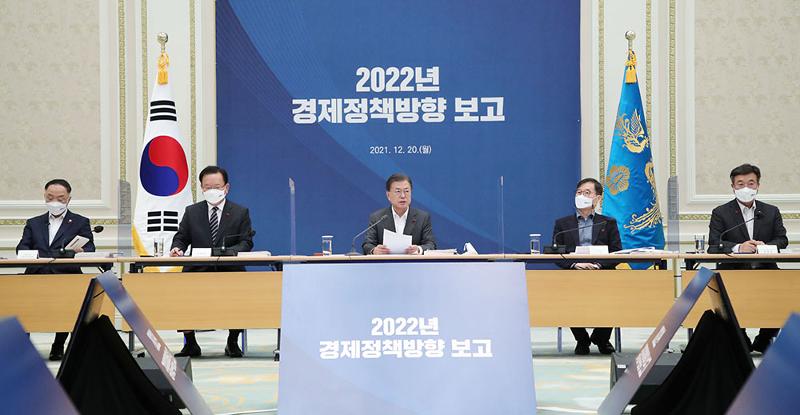
President Moon Jae-in (center) on the afternoon of Dec. 20 speaks at a meeting of the National Economic Advisory Council at Yeongbingwan State Guest House of Cheong Wa Dae. There, Deputy Prime Minister and Minister of Economy and Finance Hong Nam-ki also presented the government's economic policy direction for next year. (Yonhap News)
By Xu Aiying and Yoon Hee Young
The government predicts economic growth this year to reach 4% and 3.1% next year.
These forecasts were announced on Dec. 20 along with the administration's economic policy direction for 2022.
The government lowered its prediction for this year's growth two-tenths of a percentage point but raised that for next year's growth by one-tenth from its second-half outlook released in late June.
The growth estimate for next year is still higher than the 3% released by the Bank of Korea and Korea Development Institute and the 2.8% by Hyundai Research Institute and LG Economic Research Institute.
Though next year will be more sluggish than this year's due to the base effect, the government said things will continue to improve thanks to balanced increases in consumption, investment and exports.
Domestic consumption next year is expected to see stronger recovery at 3.8% growth from 3.5% this year thanks to the full-scale return to daily life, rise in income, improved consumer sentiment and policy support.
Vice Minister of Economy and Finance Lee Eog-weon told a preliminary briefing on the direction of economic policy next year, "Korea is expected to solidify its status in the global top 10 with growth in the 4% range and set a record high in gross national income of USD 35,000 since the breaking of the USD 30,000 mark in 2017."
Complementary measures for next year's economy will prioritize urgent matters.
In consumption, the focus of support will go to damaged sectors such as the face-to-face service industry through special deductions for additional consumption and designating a month of "win-win" consumption.
The scale of the large-scale investment project among the government, public and private sectors next year will be raised to KRW 115 trillion. Sixty-five technologies in sectors such as semiconductors and batteries will receive national designation to receive more financial and tax assistance.
Seoul will also focus on helping small businesses overcome their damage, reinforcing the social safety net and stabilizing prices.
Domestic and foreign risk factors including global supply chains, household debt and real estate will be supervised under the principle of "preemptive response before realization." Tighter management is slated for domestic issues including household debt, real estate inflation and zombie companies as well as those abroad including disruptions of the global value chain and international financial risks.
As tasks to create a pacesetting economy, Seoul will stimulate venture startups under the Korean New Deal. Marking the first anniversary of the government's declaration of its carbon neutrality goal, the government will proceed with fiscal investment of KRW 11.4 trillion and follow-up measures such as finalizing "paths toward greenhouse gas reductions."
President Moon Jae-in in the afternoon held a meeting of the National Economic Advisory Council at Yeongbingwan State Guest House of Cheong Wa Dae. Deputy Prime Minister and Minister of Economy and Finance Hong Nam-ki gave a briefing on the government's economic policy direction for 2022.
The president said in a statement, "The direction of the economic policy for 2022 contains the Government’s determination to achieve complete normalization by moving beyond the crisis. Complete economic normalization can only be accomplished within stable epidemic prevention and control efforts."
xuaiy@korea.kr